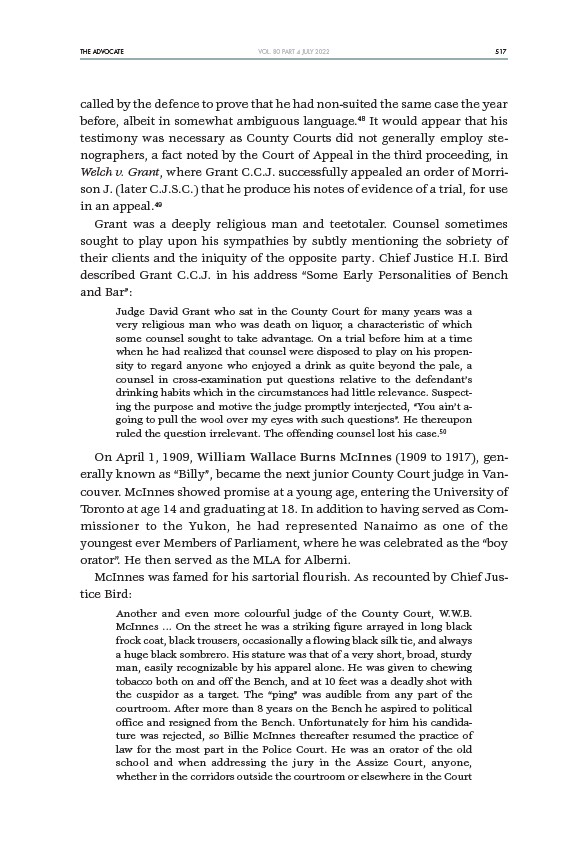
THE ADVOCATE 517
VOL. 80 PART 4 JULY 2022
called by the defence to prove that he had non-suited the same case the year
before, albeit in somewhat ambiguous language.48 It would appear that his
testimony was necessary as County Courts did not generally employ stenographers,
a fact noted by the Court of Appeal in the third proceeding, in
Welch v. Grant, where Grant C.C.J. successfully appealed an order of Morrison
J. (later C.J.S.C.) that he produce his notes of evidence of a trial, for use
in an appeal.49
Grant was a deeply religious man and teetotaler. Counsel sometimes
sought to play upon his sympathies by subtly mentioning the sobriety of
their clients and the iniquity of the opposite party. Chief Justice H.I. Bird
described Grant C.C.J. in his address “Some Early Personalities of Bench
and Bar”:
Judge David Grant who sat in the County Court for many years was a
very religious man who was death on liquor, a characteristic of which
some counsel sought to take advantage. On a trial before him at a time
when he had realized that counsel were disposed to play on his propensity
to regard anyone who enjoyed a drink as quite beyond the pale, a
counsel in cross-examination put questions relative to the defendant’s
drinking habits which in the circumstances had little relevance. Suspecting
the purpose and motive the judge promptly interjected, “You ain’t agoing
to pull the wool over my eyes with such questions”. He thereupon
ruled the question irrelevant. The offending counsel lost his case.50
On April 1, 1909, William Wallace Burns McInnes (1909 to 1917), generally
known as “Billy”, became the next junior County Court judge in Vancouver.
McInnes showed promise at a young age, entering the University of
Toronto at age 14 and graduating at 18. In addition to having served as Commissioner
to the Yukon, he had represented Nanaimo as one of the
youngest ever Members of Parliament, where he was celebrated as the “boy
orator”. He then served as the MLA for Alberni.
McInnes was famed for his sartorial flourish. As recounted by Chief Justice
Bird:
Another and even more colourful judge of the County Court, W.W.B.
McInnes … On the street he was a striking figure arrayed in long black
frock coat, black trousers, occasionally a flowing black silk tie, and always
a huge black sombrero. His stature was that of a very short, broad, sturdy
man, easily recognizable by his apparel alone. He was given to chewing
tobacco both on and off the Bench, and at 10 feet was a deadly shot with
the cuspidor as a target. The “ping” was audible from any part of the
courtroom. After more than 8 years on the Bench he aspired to political
office and resigned from the Bench. Unfortunately for him his candidature
was rejected, so Billie McInnes thereafter resumed the practice of
law for the most part in the Police Court. He was an orator of the old
school and when addressing the jury in the Assize Court, anyone,
whether in the corridors outside the courtroom or elsewhere in the Court